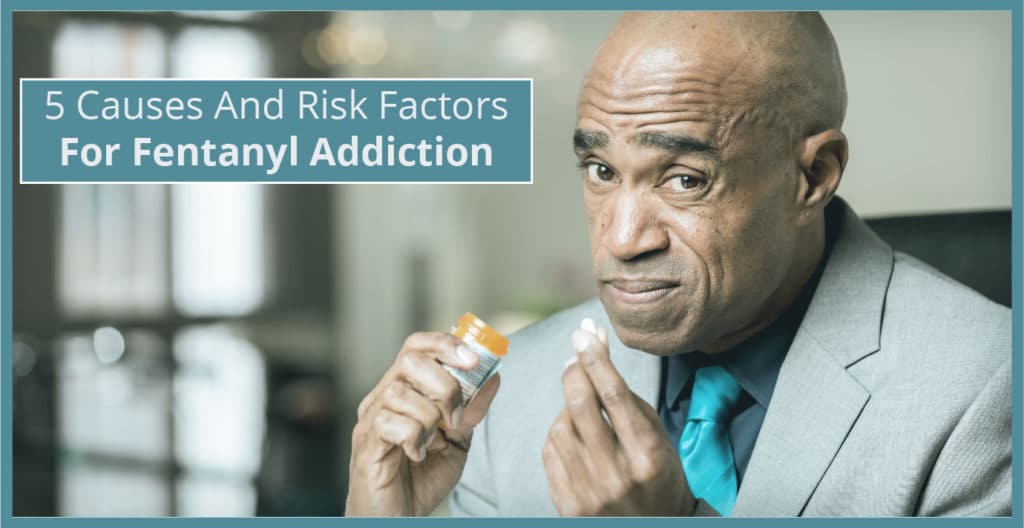Fentanyl is a synthetic opioid that is usually prescribed in a hospital setting. Fentanyl has a high potential for use, and can lead to addiction if not taken exactly as prescribed. People who have untreated mental health conditions or a history of substance use are at an increased risk for fentanyl addiction.
5 Causes And Risk Factors For Fentanyl Addiction
Fentanyl is a narcotic painkiller that changes the way the brain responds to pain. This drug is prescribed to treat breakthrough pain in cancer patients, or in instances when their regular opioid medication is not providing relief. Even if people take fentanyl as directed, they can become dependent on the medication. In recent years, fentanyl use has increased across the U.S. Certain forms of this drug may be mixed into other opioids like heroin. Fentanyl is considered to be 50 to 100 times stronger than morphine, and can result in addiction and overdose. Because of the high rates of overdose, opioid use is now considered to be an epidemic. To reduce the impacts of the epidemic, experts have identified certain causes and risk factors for opioid use.
Some of the causes and risk factors for fentanyl addiction include:
- Age, Ethnicity, And Medical History
When it comes to opioid use, certain demographic factors increase a person’s risk of addiction. Young people between the ages of 18-25 are at the highest risk for opioid addiction, and non-Hispanic Caucasian people are most at risk for overdose. Although opioid addiction affects people from all walks of life, males have a higher rate of opioid use and addiction than females. Living in a rural environment also increases a person’s risk of fentanyl use. Additionally, people who have experienced pain due to a medical condition or serious injury are at a higher risk for fentanyl addiction. This is due to the fact that people with legitimate health concerns may have greater access to opioids like fentanyl.
- Genetics And Family History
When a person has a history of alcohol or drug addiction in their family, it automatically increases their risk for fentanyl addiction. This is due to certain genetic factors that may influence their decisions around substances. Certain personality traits can also increase a person’s risk, including impulsivity and a tendency toward thrill-seeking behaviors. Additionally, people who were raised in an environment with substance use can be deeply impacted by observing addiction firsthand. Seeing alcohol or drug addiction at a young age can create a mindset that normalizes substance use.
- Social Influences
People who suffer from fentanyl addiction can also be influenced by who they are around socially. A person struggling with fentanyl addiction may begin to spend all of their time around those who also use drugs. This can keep people locked in the cycle of addiction, as it’s difficult to stop using when everyone around you is doing the same thing. When a person uses opioids like fentanyl, they may say or do things that seem out of character for them. They may lie, behave secretively, or steal things to pay for their opioid habit. These behaviors can lead people to become isolated from healthy family members and friends, which furthers their risk of addiction. [inline_cta_three]
- History Of Mental Health Conditions
Studies have found that people who have an untreated mental illness like bipolar disorder or depression are at an increased risk for opioid use. Living with a mental health condition can be uncomfortable, and drugs like fentanyl cause feelings of relaxation and intense euphoria. People who aren’t actively seeking treatment for their mental health condition may use opioids as a way to cope with difficult feelings. Those who grew up with family members who had mental health struggles are also at a higher risk of fentanyl addiction. Untreated psychiatric disorders and a family history of mental health conditions are both considered to be risk factors for opioid use disorder.
- Past Or Current Substance Use
A history of drug or alcohol use is considered a risk factor for opioid addiction. If a person has used any substances in their past, their medical provider should be aware before prescribing fentanyl. People who use substances and take fentanyl should also be aware that they are at an increased risk for use, addiction, and overdose. Every day in the U.S., 15 people die from opioid overdose, and drugs like fentanyl have only increased these rates. Combining fentanyl with any other drugs also increases a person’s risk of overdose, especially if they take fentanyl with alcohol, benzodiazepines, or other opioids.
Getting Help For Fentanyl Addiction
Fentanyl is one of the strongest opioids, and can quickly result in addiction. It’s important to be aware of the risk factors for fentanyl addiction. Awareness can help prevent overdose, and also encourage people who are addicted to get the help they need. Opioids like fentanyl create a powerful physical dependence. This can cause people to crave the drug, even if they want to quit using. People who are dependent on fentanyl will likely experience withdrawal if they don’t get their next dose. Opioid withdrawal is not usually life-threatening, but can be challenging to endure without professional help. Many people end up relapsing (returning to the drug) because they are unaware of how to manage opioid withdrawal symptoms. If you or someone you love struggles with fentanyl drug dependence, there is help available. Medically supervised detox and comprehensive treatment is available at rehab centers like The Bluffs. At The Bluffs, we offer on-site medical detoxification that helps people stop taking opioids. Once they have detoxed from fentanyl, our treatment staff engages patients in a blend of therapies that include motivational interviewing, group counseling, and nature-based adventure therapies. For those who have co-occurring mental health conditions, we offer specialized dual diagnosis counseling. It’s possible to recover from the clutches of opioid use. For more information about the causes and risk factors for fentanyl addiction, or to learn more about The Bluffs, contact a treatment specialist today. Sources: U.S. Department of Health and Human Services — What Are Opioids? U.S. National Library of Medicine, MedlinePlus — Fentanyl U.S. National Library of Medicine, National Institutes of Health — Risk Factors for Opioid-Use Disorder and Overdose. United States Drug Enforcement Administration — DEA Report: Counterfeit Pills Fueling U.S. Fentanyl And Opioid Crisis








